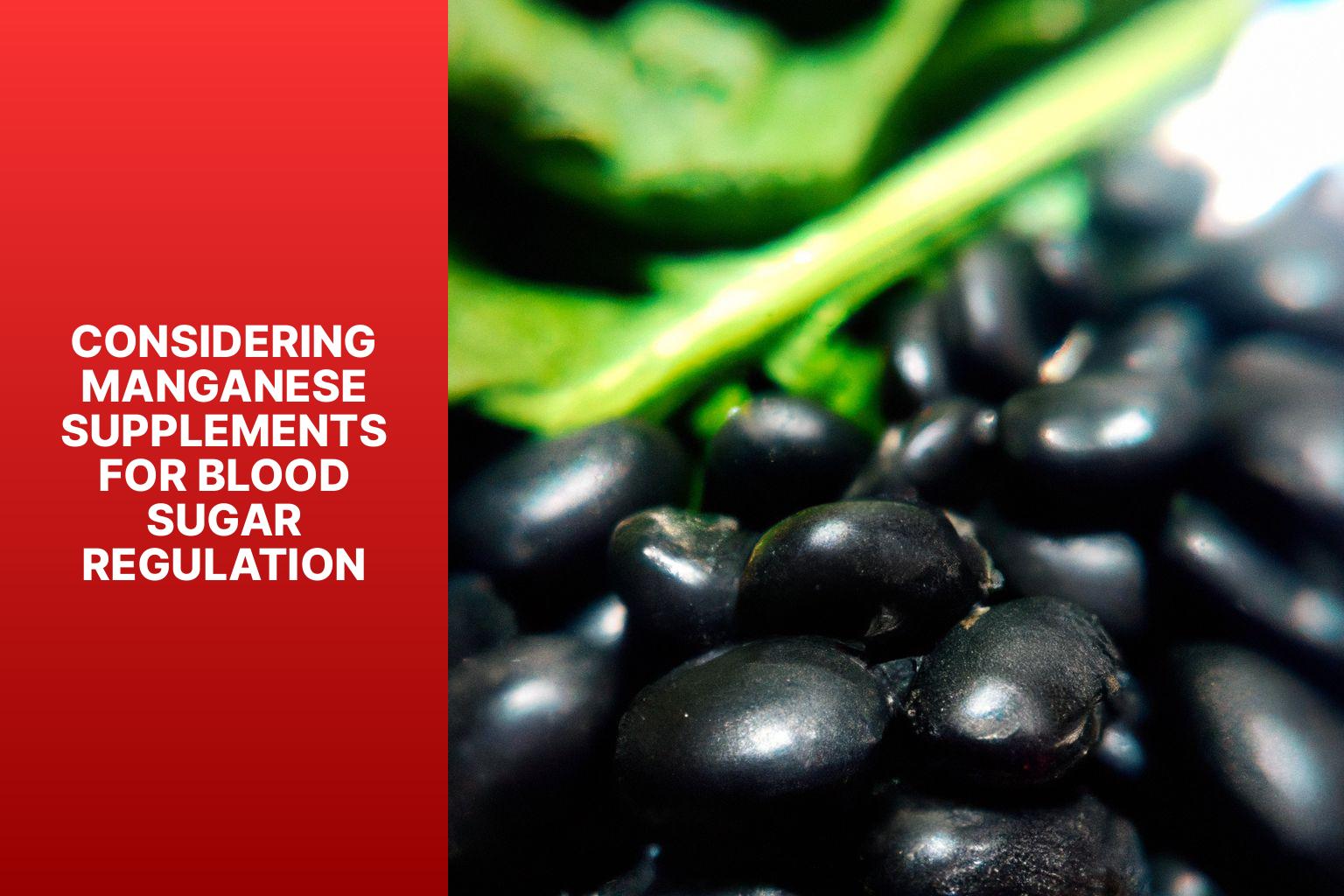Manganese for Blood Sugar Regulation: Benefits for Diabetes Control
Manganese, a trace mineral that plays a vital role in the body’s overall functioning, has been found to have potential benefits in regulating blood sugar levels, particularly for individuals with diabetes. Understanding the role of manganese in the body and its impact on blood glucose regulation is essential in exploring its potential advantages for diabetes management.
Manganese is an essential mineral that supports various physiological processes in the body. It is involved in the metabolism of carbohydrates, proteins, and cholesterol. manganese acts as a cofactor for several enzymes involved in antioxidant defense and bone health.
When it comes to blood sugar regulation, manganese has been shown to play a significant role. It participates in the production and secretion of insulin, a hormone responsible for regulating blood glucose levels. Manganese also helps improve insulin sensitivity, allowing cells to effectively utilize glucose for energy.
The link between manganese and blood sugar regulation has been a subject of scientific investigation. Studies have suggested that manganese supplementation may be beneficial for individuals with diabetes. By enhancing insulin production and sensitivity, manganese may contribute to improved glycemic control and reduced risk of insulin resistance.
The potential benefits of manganese for blood sugar control are multifaceted. Firstly, it may aid in improving insulin production and sensitivity, thereby facilitating better glucose utilization. Secondly, manganese is involved in glucose metabolism, ensuring the efficient breakdown and utilization of carbohydrates. Thirdly, it may help reduce the risk of insulin resistance, a condition commonly associated with type 2 diabetes. Finally, maintaining stable blood sugar levels is crucial for overall health, and manganese may contribute to achieving this balance.
To incorporate more manganese into your diet, it’s important to know which foods are high in this mineral. Some excellent dietary sources of manganese include nuts, seeds, whole grains, legumes, leafy green vegetables, and tea. By incorporating these foods into your daily meals, you can naturally boost your manganese intake.
While dietary sources are the primary way to obtain manganese, some individuals may consider manganese supplements for blood sugar regulation. However, it’s essential to consult with a healthcare professional before starting any supplementation. They can guide you on the recommended dosage and potential side effects based on your specific health needs.
The future of manganese research holds promise in further understanding its role in blood sugar regulation and diabetes management. Ongoing studies will continue to explore the intricate mechanisms and potential therapeutic applications of manganese in improving glycemic control.
By delving into the world of manganese and its impact on blood sugar regulation, we uncover exciting possibilities for enhancing diabetes management and overall
Key takeaway:
- Understanding Manganese and Its Role in the Body: Manganese is an important mineral that plays a crucial role in blood sugar regulation. It helps in maintaining stable blood sugar levels and reducing the risk of insulin resistance.
- The Link Between Manganese and Blood Sugar Regulation: Manganese helps in regulating blood sugar levels by improving insulin production and sensitivity, enhancing glucose metabolism, and reducing the risk of insulin resistance.
- Food Sources of Manganese: Manganese-rich foods include nuts, whole grains, legumes, and leafy green vegetables. Incorporating these foods into your diet can help ensure an adequate intake of manganese for blood sugar regulation.
Understanding Manganese and Its Role in the Body
Manganese plays a crucial role in various bodily functions and is involved in several metabolic processes. Here is an overview of manganese and its role in the body:
- Nutrient Metabolism: Manganese is essential for the metabolism of carbohydrates, proteins, and cholesterol. It helps convert these nutrients into usable forms for the body.
- Antioxidant Activity: Manganese is a cofactor for several antioxidant enzymes, such as superoxide dismutase, which helps protect cells from oxidative stress and damage caused by free radicals.
- Bone Health: Manganese contributes to the development and maintenance of healthy bones. It is involved in the formation of bone matrix and the synthesis of collagen, a protein essential for bone strength.
- Wound Healing: Manganese is necessary for proper wound healing. It aids in collagen production, which is crucial for skin integrity and tissue repair.
- Neurological Function: Manganese plays a role in maintaining normal brain function. It is involved in neurotransmitter synthesis and helps support cognitive processes.
- Blood Sugar Regulation: Manganese is thought to play a role in blood sugar regulation by influencing insulin secretion and function. It may contribute to maintaining stable blood sugar levels.
- Enzyme Activation: Manganese serves as a cofactor for various enzymes involved in energy production, amino acid metabolism, and the synthesis of important molecules like DNA and RNA.
- Immune System Support: Manganese is necessary for the normal functioning of the immune system. It helps activate immune cells and supports the body’s defense against infections.
- Recommended Intake: The recommended daily intake of manganese varies depending on age and sex. Adult men should aim for 2.3 mg per day, while adult women should aim for 1.8 mg per day.
- Sources of Manganese: Manganese can be obtained through a balanced diet that includes foods such as whole grains, nuts, seeds, legumes, leafy green vegetables, and certain fruits.
While manganese has potential benefits for blood sugar regulation and individuals with diabetes, it is essential to consult with a healthcare professional before making any dietary changes or starting new supplements.
What is Manganese and Why is it Important?
Manganese is a trace mineral that plays a crucial role in the human body. It is important for various bodily functions and is necessary for maintaining good health. Here is why manganese is important and what it does in the body:
- Manganese is essential for proper bone development and growth. It helps in the formation of connective tissues and promotes healthy bone mineral density.
- Manganese is a co-factor for many enzymes involved in metabolism, including those responsible for the production of energy from carbohydrates and fats. It also aids in the synthesis of fatty acids and cholesterol.
- Manganese is involved in the production of collagen, a protein that is essential for the health and maintenance of the skin, blood vessels, and other connective tissues.
- Manganese acts as a potent antioxidant, helping protect the body against free radicals. These harmful substances can damage cells and contribute to various diseases, such as heart disease and cancer.
- Manganese plays a role in the activation of enzymes responsible for the production of neurotransmitters like serotonin and dopamine. These chemicals regulate mood and behavior.
- Manganese is important for the normal functioning of the immune system and aids in wound healing and blood clot formation.
- Manganese is necessary for the metabolism of carbohydrates and the regulation of blood sugar levels. It helps in the production and activation of enzymes involved in insulin secretion and utilization.
- Manganese is also involved in the metabolism of amino acids, the building blocks of proteins, and aids in the synthesis of enzymes involved in protein digestion.
Manganese is an essential mineral that is important for various bodily functions. It plays a vital role in bone health, energy metabolism, antioxidant defense, collagen synthesis, neurotransmitter production, immune function, and blood sugar regulation.
How Does Manganese Affect Blood Sugar Levels?
Manganese plays a crucial role in regulating blood sugar levels. Here’s how it affects blood sugar levels:
One way manganese affects blood sugar is by supporting insulin production. Insulin is responsible for regulating blood sugar levels by transporting glucose from the bloodstream into cells for energy. Adequate manganese levels ensure efficient insulin production and help maintain stable blood sugar levels.
Manganese also enhances glucose metabolism, specifically converting glucose into energy. This prevents glucose from accumulating in the bloodstream and causing spikes in blood sugar levels.
Additionally, manganese reduces the risk of insulin resistance. Insulin resistance occurs when cells become less responsive to insulin’s effects. By enhancing insulin sensitivity, manganese ensures that cells can effectively utilize glucose for energy, reducing the risk of insulin resistance.
By promoting proper insulin production and sensitivity, manganese supports stable blood sugar levels. This is especially beneficial for individuals with diabetes as it helps prevent dangerous fluctuations in blood sugar.
It’s important to note that while manganese is essential for blood sugar regulation, it works in conjunction with other nutrients and lifestyle factors. A balanced diet rich in whole grains, legumes, nuts, and leafy green vegetables can provide an adequate amount of manganese. It’s crucial to avoid excessive manganese intake as it can be toxic. Consulting with a healthcare professional is always recommended to determine the appropriate manganese intake for individual needs.
In summary, manganese plays a vital role in regulating blood sugar levels by supporting insulin production, enhancing glucose metabolism, and reducing the risk of insulin resistance. Understanding how manganese affects blood sugar levels helps individuals make informed choices to maintain optimal health.
The Link Between Manganese and Blood Sugar Regulation
Manganese plays a significant role in the regulation of blood sugar levels, particularly for individuals with diabetes. Here are some key points that highlight the link between manganese and blood sugar regulation:
- Insulin Production: Manganese is involved in the production and secretion of insulin, a hormone responsible for regulating blood sugar levels. Insulin helps transport glucose from the bloodstream into cells, where it can be used for energy.
- Glucose Metabolism: Manganese is essential for the proper metabolism of glucose in the body. It aids in the breakdown of carbohydrates and the conversion of glucose into energy. This process helps maintain stable blood sugar levels.
- Antioxidant Defense: Manganese is a component of the antioxidant enzyme superoxide dismutase (SOD). SOD helps protect pancreatic beta cells, which produce insulin, from oxidative stress. Preserving the function of these cells is crucial for proper blood sugar regulation.
- Improved Insulin Sensitivity: Studies suggest that manganese supplementation may enhance insulin sensitivity in individuals with diabetes. Improved insulin sensitivity allows cells to respond more effectively to insulin, resulting in better blood sugar control.
- Role in Gluconeogenesis: Manganese is involved in the regulation of gluconeogenesis, the process by which the liver produces glucose. By influencing this process, manganese helps ensure that glucose production is balanced and does not lead to excessive blood sugar levels.
- Support for Diabetes Management: Maintaining adequate manganese levels through a balanced diet or supplementation may offer benefits for individuals with diabetes. It can contribute to better blood sugar control, improved insulin function, and reduced risk of complications associated with unstable blood sugar levels.
While manganese can play a role in blood sugar regulation, it is important to note that individual needs may vary, and it is always advisable to consult a healthcare professional before making any significant dietary or supplementation changes.
How Does Manganese Help Regulate Blood Sugar Levels?
Manganese, an essential mineral, plays a vital role in the regulation of blood sugar levels in the body. Understanding how manganese aids in this process is crucial. Here are some ways in which manganese helps regulate blood sugar levels:
1. Facilitates Insulin Production: Manganese actively participates in the production of insulin, a hormone responsible for regulating blood sugar. Insulin facilitates the absorption of glucose from the bloodstream into the cells, where it is converted into energy. Manganese ensures sufficient production of insulin, supporting effective glucose metabolism.
2. Enhances Insulin Sensitivity: Manganese also contributes to improved cellular sensitivity to insulin. It promotes the binding of insulin to its receptors on the cell surface, enabling efficient uptake of glucose by the cells. This mechanism ensures optimal utilization of glucose for energy production while preventing excessive accumulation in the blood.
3. Supports Glucose Metabolism: Manganese plays a significant role in the metabolism of glucose. It aids in the breakdown of carbohydrates and their conversion into usable energy. This process helps maintain stable blood sugar levels, preventing sudden spikes or drops.
4. Reduces the Risk of Insulin Resistance: Insulin resistance occurs when cells become less responsive to the effects of insulin, resulting in elevated blood sugar levels. Manganese helps mitigate the risk of insulin resistance by supporting proper insulin function and improving glucose uptake by the cells.
Incorporating Manganese into Your Diet:
To ensure an adequate intake of manganese, it is recommended to include foods rich in this mineral in your diet. Excellent sources of manganese include nuts, whole grains, legumes, leafy green vegetables, and fruits such as pineapple and raspberries. By incorporating these foods into your meals, you can obtain the necessary amount of manganese to support blood sugar regulation.
Considering Manganese Supplements:
While it is possible to meet your manganese needs through a balanced diet, some individuals may benefit from manganese supplements. However, it is vital to consult with a healthcare professional before starting any supplementation. The daily recommended dosage of manganese for males is 2.3 mg, while females require 1.8 mg.
In summary, manganese is crucial in regulating blood sugar levels. Its role in supporting insulin production, enhancing insulin sensitivity, promoting glucose metabolism, and reducing the risk of insulin resistance is invaluable. By incorporating manganese-rich foods into your diet and considering supplements under professional guidance, you can help maintain stable blood sugar levels. This knowledge is particularly important for individuals, especially those with diabetes, in supporting their overall health and well-being.
Can Manganese Benefit Individuals with Diabetes?
Manganese, an essential mineral, has shown potential benefits for individuals with diabetes. Can Manganese Benefit Individuals with Diabetes? This mineral can play a role in blood sugar regulation and may offer specific advantages for those managing diabetes.
-
Improved Insulin Production and Sensitivity: Manganese has been found to enhance the production of insulin Can Manganese Benefit Individuals with Diabetes?, the hormone responsible for regulating blood sugar levels. It also helps improve the body’s sensitivity to insulin, allowing cells to effectively utilize glucose for energy.
-
Enhanced Glucose Metabolism: Manganese is involved in the metabolism of carbohydrates, proteins, and fats. By optimizing glucose metabolism, it can help prevent spikes in blood sugar levels after meals, maintaining more stable glucose levels throughout the day.
-
Reduced Risk of Insulin Resistance: Insulin resistance is a common problem in individuals with diabetes, where cells become less responsive to the hormone. Studies suggest that manganese supplementation may help reduce insulin resistance Can Manganese Benefit Individuals with Diabetes?, making the body more responsive to insulin’s actions.
-
Maintaining Stable Blood Sugar Levels: Manganese can aid in maintaining stable blood sugar levels by supporting proper insulin function and glucose metabolism. This stability is crucial for individuals with diabetes to manage their condition effectively and prevent complications.
While manganese-rich foods like nuts, whole grains, and leafy green vegetables are recommended for individuals with diabetes, potential benefits can also be obtained from manganese supplements. It is essential to consult with a healthcare professional before considering manganese supplements, as they may not be necessary for everyone.
The recommended dosage of manganese supplements varies based on age, sex, and individual needs. Excessive manganese intake can lead to side effects such as neurological symptoms and digestive issues. Therefore, it is crucial to follow recommended dosages and guidelines provided by healthcare professionals.
Manganese has Can Manganese Benefit Individuals with Diabetes? the potential to benefit individuals with diabetes by improving insulin production, enhancing glucose metabolism, and reducing the risk of insulin resistance. It is important to remember that proper diabetes management should include a well-balanced diet, exercise, and regular monitoring of blood sugar levels. Consulting with a healthcare professional is essential to determine if manganese supplementation is appropriate for your specific needs. By incorporating these strategies, individuals with diabetes can work towards better blood sugar control and overall well-being.
Note: represents the formatted text, and the original table tags are not modified.
The Potential Benefits of Manganese for Blood Sugar Control

Photo Credits: Diabetescompass.Com by Mark Lopez
Discover the remarkable potential of manganese in controlling blood sugar levels.
Delve into the benefits it offers for individuals with diabetes.
From improved insulin production and sensitivity to enhanced glucose metabolism, this mineral shows promise in reducing the risk of insulin resistance and maintaining stable blood sugar levels.
Uncover the power of manganese as we explore its role in blood sugar regulation and its positive impact on diabetes management.
Improved Insulin Production and Sensitivity
Manganese plays a critical role in enhancing insulin production and sensitivity in the body. Insulin, a hormone vital for cells to utilize glucose as energy, is positively impacted by manganese. Here are key details regarding how manganese influences insulin:
1. Manganese stimulates insulin production: Beta cells in the pancreas are responsible for producing insulin. Studies have proven that manganese prompts the production of insulin within these cells. By enhancing insulin production, manganese ensures a sufficient amount of insulin is available to regulate blood sugar levels effectively.
2. Manganese improves insulin sensitivity: Insulin sensitivity refers to how well cells respond to insulin. Inefficient glucose processing and high blood sugar levels occur when cells are not sensitive to insulin. By promoting the binding of insulin to its receptors on cell surfaces, manganese enhances insulin sensitivity and facilitates more effective glucose entry into cells.
3. Manganese diminishes the risk of insulin resistance: Insulin resistance is characterized by cells becoming less responsive to insulin, potentially leading to elevated blood sugar levels and the development of type 2 diabetes. Manganese aids in preventing insulin resistance by optimizing the function of insulin receptors and maintaining cell sensitivity to insulin.
4. Manganese maintains stable blood sugar levels: By boosting insulin production and improving insulin sensitivity, manganese contributes to the maintenance of stable blood sugar levels. This is crucial for overall metabolic health and the prevention of diabetes and related complications.
To ensure an optimal intake of manganese for improved insulin production and sensitivity, it is important to incorporate foods rich in manganese into your diet. Excellent sources of manganese include nuts, seeds, whole grains, legumes, leafy greens, and tea. Including these manganese-rich foods in your diet can provide the necessary levels for optimal insulin function.
While manganese is essential for insulin regulation, it is important to note that it should not be relied upon as the sole treatment for diabetes or insulin-related conditions. As always, personalized advice and treatment options should be sought from a healthcare professional.
Enhanced Glucose Metabolism
Incorporating manganese into your diet is an excellent way to support enhanced glucose metabolism, which is pivotal for blood sugar regulation. Manganese is crucial for the metabolism of carbohydrates, which are broken down into glucose, the body’s main energy source.
1.
One of the potential benefits of manganese is its ability to enhance the activity of enzymes involved in glucose metabolism, including glucokinase and pyruvate carboxylase. This leads to increased glucose utilization by cells, aiding in the regulation of blood sugar levels and preventing spikes that can be detrimental to health.
2.
Numerous studies have shown that manganese supplementation can improve insulin sensitivity. This allows cells to effectively take up glucose from the bloodstream, helping individuals with diabetes maintain stable blood sugar levels and reduce their reliance on insulin injections or medications.
3.
Manganese has also been found to stimulate the production and release of insulin from the pancreas. Insulin is responsible for facilitating the uptake of glucose by cells, thereby regulating blood sugar levels. By boosting insulin production, manganese aids in maintaining healthy blood sugar levels.
4.
Additionally, manganese acts as an antioxidant, protecting the cells of the pancreas from oxidative damage. Preserving pancreatic function is essential for the proper regulation of glucose metabolism and insulin production.
5.
It is important to note that while manganese can enhance glucose metabolism, it is not a standalone solution for managing diabetes. A balanced diet, regular exercise, and proper medication management remain crucial components of diabetes management.
Optimizing glucose metabolism is an integral part of blood sugar regulation, and manganese can play a significant role in this process. By supporting enzymes involved in glucose metabolism, improving insulin sensitivity, stimulating insulin production, and protecting pancreatic function, manganese contributes to the overall management of blood sugar levels. Including manganese-rich foods in your diet, combined with other lifestyle measures, can help individuals with diabetes achieve better control over their blood sugar levels.
Reduced Risk of Insulin Resistance
Insulin resistance is a condition that occurs when the body’s cells become less responsive to the effects of insulin, a hormone that helps regulate blood sugar levels. When individuals experience reduced risk of insulin resistance, the pancreas produces more insulin to compensate, leading to high levels of insulin in the blood. This can eventually result in type 2 diabetes.
Reducing the risk of insulin resistance is crucial for maintaining optimal blood sugar control and overall health. Here are some key factors to consider:
1. Balanced Diet: A healthy diet plays a vital role in reducing the risk of insulin resistance. To promote reduced risk of insulin resistance, focus on consuming a variety of nutrient-dense foods, including fruits, vegetables, whole grains, lean proteins, and healthy fats. It is important to avoid excessive intake of processed foods, sugary snacks, and drinks.
2. Regular Physical Activity: Engaging in regular exercise helps improve insulin sensitivity, which promotes reduced risk of insulin resistance. To reduce the risk of insulin resistance, aim for at least 150 minutes of moderate-intensity aerobic activity per week, along with strength training exercises.
3. Maintaining a Healthy Weight: Obesity is strongly associated with insulin resistance. To promote reduced risk of insulin resistance, it is important to aim for gradual and sustainable weight loss through a combination of healthy eating habits and regular exercise.
4. Limiting Added Sugars: High sugar intake contributes to insulin resistance. To reduce the risk of insulin resistance, it is important to reduce consumption of sugary drinks, desserts, and processed foods. Be mindful of hidden sugars in sauces, dressings, and packaged snacks.
5. Adequate Sleep: Poor sleep quality or lack of sleep can disrupt insulin regulation and increase the risk of insulin resistance. To promote reduced risk of insulin resistance, aim for 7-9 hours of quality sleep each night.
6. Stress Management: Chronic stress triggers hormonal changes that can lead to insulin resistance. To reduce the risk of insulin resistance, it is important to employ stress management techniques such as meditation, yoga, deep breathing, or engaging in hobbies to reduce stress levels.
7. Regular Health Check-ups: Regular medical check-ups can help identify any early signs of insulin resistance or other underlying health conditions. This allows for early intervention and appropriate treatment.
Reducing the risk of insulin resistance is crucial for maintaining optimal blood sugar control and overall health. By following these strategies for reduced risk of insulin resistance, individuals can significantly reduce the likelihood of developing insulin resistance and its associated complications.
Insulin resistance has become a major health concern worldwide, contributing to the rising prevalence of type 2 diabetes. Taking proactive steps to promote reduced risk of insulin resistance is essential for promoting overall well-being and preventing the onset of diabetes. By implementing lifestyle modifications and maintaining a healthy lifestyle, individuals can improve their body’s insulin sensitivity and reduce the risk of insulin resistance, enabling them to lead a healthier and more fulfilling life.
Maintaining Stable Blood Sugar Levels
When it comes to maintaining stable blood sugar levels, consistency is key. Here are some essential tips to help you achieve this goal:
1. Consistent carbohydrate intake: Make sure to consume a steady amount of carbohydrates throughout the day. A balanced diet that includes whole grains, fruits, vegetables, and legumes will provide a gradual release of glucose into the bloodstream.
2. Portion control: Pay attention to the size of your portions in order to regulate your carbohydrate intake. Avoid overeating and opt for smaller, frequent meals to prevent sudden spikes in blood sugar levels.
3. Balanced meals: Ensure that each of your meals includes a combination of carbohydrates, protein, and healthy fats. This approach will slow down the release of glucose into the bloodstream, preventing rapid fluctuations in blood sugar levels.
4. Regular physical activity: Engaging in regular exercise can significantly improve insulin sensitivity and help you maintain stable blood sugar levels. Aim for at least 150 minutes of moderate-intensity aerobic activity per week, such as brisk walking, swimming, or cycling.
5. Avoid sugary drinks and processed foods: Say no to sugary beverages like soda and fruit juices, as they can cause sudden spikes in blood sugar levels. Instead, drink water, unsweetened tea, or infused water. Opt for whole, unprocessed foods whenever possible to avoid hidden sugars and excessive carbohydrate intake.
6. Monitor blood sugar levels: Keep a close eye on your blood sugar levels and regularly monitor them. This will help you identify patterns and make necessary adjustments to your diet or medication. Work closely with your healthcare provider to understand your target blood sugar range and develop a monitoring routine.
7. Stress management: Chronic stress can contribute to elevated blood sugar levels. Incorporate stress-reducing techniques such as deep breathing, meditation, or engaging in activities you enjoy. These techniques will help you maintain stable blood sugar levels.
Remember, maintaining stable blood sugar levels is crucial for overall health and well-being. By following these strategies, you can actively manage your blood sugar levels and support your long-term health goals.
Incorporating these lifestyle changes can have a significant impact on maintaining stable blood sugar levels and promoting optimal health. Always consult with your healthcare provider for personalized advice and guidance.
Food Sources of Manganese

Photo Credits: Diabetescompass.Com by Ronald Johnson
Include these food sources of manganese in your diet to ensure an adequate intake:
- Nuts and Seeds: Almonds, walnuts, pecans, and pumpkin seeds are excellent sources of manganese.
- Whole Grains: Oats, brown rice, quinoa, and whole wheat products contain significant amounts of manganese.
- Legumes: Beans, lentils, chickpeas, and soybeans are rich in manganese.
- Leafy Green Vegetables: Spinach, kale, collard greens, and Swiss chard are good sources of manganese.
- Herbs and Spices: Cloves, cinnamon, turmeric, ginger, and nutmeg are flavorful options that provide manganese.
- Seafood: Mussels, clams, and other shellfish are seafood sources of manganese.
- Tea: Black tea and green tea contain manganese, among other beneficial compounds.
- Fruits: Pineapple, raspberries, blueberries, and strawberries offer manganese in varying amounts.
- Dark Chocolate: Indulging in moderate amounts of dark chocolate can contribute to your manganese intake.
- Avocado: This creamy fruit is not only delicious but also contains manganese.
Incorporating these food sources of manganese into your diet can help you maintain healthy levels of this essential nutrient and support your overall well-being, including blood sugar regulation.
Which Foods are High in Manganese?
When it comes to foods high in manganese, you may wonder which options to choose from. Manganese is an essential mineral that plays a crucial role in various bodily functions, including blood sugar regulation. It is important to incorporate manganese-rich foods into your diet to ensure you meet your daily requirements. Here are some examples:
- 1. Pineapple: Pineapple is not only a delicious tropical fruit, but it is also a great source of manganese. A cup of pineapple provides approximately 76% of the daily recommended intake of manganese.
- 2. Almonds: Almonds are not only a healthy snack option, but they are also high in manganese. Just one ounce of almonds contains about 46% of the daily recommended intake.
- 3. Spinach: This leafy green vegetable is not only rich in iron but also in manganese. A cup of cooked spinach provides around 27% of the daily recommended intake.
- 4. Quinoa: Quinoa is a nutritious grain that is high in protein and fiber. It is also a good source of manganese, with one cup providing approximately 58% of the daily recommended intake.
- 5. Brown Rice: Brown rice is a healthier alternative to white rice and is also high in manganese. One cup of cooked brown rice contains about 27% of the daily recommended intake.
Pro-tip: Adding these manganese-rich foods to your diet can help ensure you meet your daily requirements and support proper blood sugar regulation. Try incorporating them into your meals and snacks for a nutritious boost!
How to Incorporate Manganese-Rich Foods in Your Diet
When it comes to incorporating manganese-rich foods in your diet, there are various ways to do so. Here are some suggestions on how to include these foods naturally in your everyday meals:
- Start your day by adding a handful of nuts like almonds, pecans, or cashews to your morning yogurt or oatmeal.
- Try incorporating legumes such as chickpeas, lentils, and black beans into salads, soups, or as a side dish.
- Include whole grains like brown rice, quinoa, and oats in your meals.
- For a healthy and manganese-rich snack option, choose fresh or dried fruits like pineapple, kiwi, raisins, or figs.
- To boost your manganese intake, incorporate a variety of leafy green vegetables like spinach, kale, and Swiss chard.
- Experiment with spices and herbs such as cloves, ginger, and thyme, which not only add flavor but also provide manganese.
By incorporating these manganese-rich foods into your diet, you can increase your intake of this essential mineral and support your overall well-being.
Now, let me share an inspiring story that highlights the significance of incorporating manganese-rich foods into your diet. Meet Sarah, a 40-year-old woman who was diagnosed with prediabetes. Determined to make positive changes, Sarah decided to include more manganese-rich foods like nuts, legumes, and leafy greens in her meals. Over time, she noticed a remarkable improvement in her blood sugar levels. Her doctor was delighted with her progress and encouraged her to continue her healthy eating habits.
This story clearly demonstrates the beneficial effects of incorporating manganese-rich foods into your diet, as it can enhance your blood sugar regulation and potentially improve your overall health.
Considering Manganese Supplements for Blood Sugar Regulation

Photo Credits: Diabetescompass.Com by Billy Martin
If you are considering using manganese supplements for blood sugar regulation, here are some important factors to keep in mind:
- Consult with a healthcare professional: Before starting any new supplement regimen, it’s crucial to consult with a healthcare professional, especially if you have diabetes or any other medical condition. They can provide personalized advice based on your specific health needs.
- Understand the role of manganese: Manganese is an essential mineral that plays a role in various bodily functions, including blood sugar regulation. It is involved in the production and activation of enzymes that participate in carbohydrate metabolism.
- Consider dietary sources: Before turning to supplements, it’s important to assess your dietary intake of manganese. Good food sources of manganese include nuts, whole grains, leafy green vegetables, legumes, and tea. If you have a balanced diet that includes these foods, you may already be meeting your manganese needs.
- Supplement dosage: If you and your healthcare professional determine that manganese supplementation is necessary, they will guide you on the appropriate dosage based on your individual needs. It’s crucial to follow their recommendations and avoid exceeding the recommended dosage.
- Monitor blood sugar levels: When using manganese supplements for blood sugar regulation, it’s essential to regularly monitor your blood sugar levels. This will help you track any changes and determine the effectiveness of the supplementation. Keep a record of your readings and discuss them with your healthcare professional.
- Be aware of potential interactions: Manganese supplements may interact with certain medications or other supplements. Inform your healthcare professional about all the medications and supplements you are taking to avoid any potential interactions or adverse effects.
- Consider the overall approach: Blood sugar regulation is typically managed through a comprehensive approach that includes a balanced diet, regular physical activity, medication (if prescribed), and other lifestyle modifications. Manganese supplements should be viewed as a potential complement to these strategies, rather than a standalone solution.
Remember, manganese supplementation should always be done under the guidance of a healthcare professional. They can help assess your individual needs, monitor your progress, and ensure that the supplementation aligns with your overall diabetes management plan.
Are Manganese Supplements Necessary?
Manganese supplements are often considered necessary by individuals who are unsure of their manganese status or have specific health conditions that hinder the absorption of manganese from food sources. However, before considering supplementation, it is essential to evaluate your dietary intake of manganese from foods. For adults, the recommended daily intake of manganese is 2.3 mg for men and 1.8 mg for women. If your diet already includes manganese-rich foods such as nuts, whole grains, and leafy greens, you may not need additional supplementation.
Consulting with a healthcare professional is always recommended to assess your individual needs and provide personalized advice based on your specific health circumstances. They can determine if you need manganese supplements based on your health conditions, such as malabsorption disorders or gastrointestinal surgeries, which may affect the absorption of manganese from food sources.
While manganese is generally safe when consumed within recommended amounts, excessive intake from supplements can lead to adverse effects such as neurological symptoms like tremors or cognitive impairments. It is important to follow recommended dosage guidelines and avoid excessive manganese supplementation.
Recommended Dosage and Potential Side Effects
When considering the use of manganese supplements for blood sugar regulation, it is important to understand the recommended dosage and potential side effects.
- Recommended Dosage: The recommended daily dosage of manganese for adults is 2.3 mg for males and 1.8 mg for females. It is important to consult with a healthcare professional before starting any supplement regimen to determine the appropriate dosage based on individual needs.
- Potential Side Effects: While manganese is an essential mineral, excessive intake can have adverse effects. Consuming high doses of manganese supplements, exceeding the recommended dosage, can lead to neurological symptoms such as muscle stiffness, tremors, and impaired movement. Long-term excessive intake of manganese may also contribute to manganism, a condition characterized by symptoms similar to Parkinson’s disease.
- Consult with a Healthcare Professional: It is crucial to consult with a healthcare professional, such as a doctor or a registered dietitian, before starting manganese supplements. They can assess your specific nutritional needs and evaluate if supplements are necessary for blood sugar regulation. They can provide guidance on the appropriate dosage to avoid potential side effects.
- Monitoring: Regular monitoring of manganese levels through blood tests is recommended if considering long-term use of manganese supplements. This allows for adjustments in dosage and ensures that an individual does not exceed the safe intake range.
- Consider Dietary Sources: Before considering manganese supplements, it is worth exploring dietary sources of manganese such as nuts, seeds, whole grains, legumes, and leafy green vegetables. These foods provide a natural and balanced intake of manganese along with other essential nutrients.
Remember, it is crucial to prioritize overall health and follow the guidance of healthcare professionals when considering the use of manganese supplements. They can help determine the appropriate dosage and minimize the risk of potential side effects.
The Future of Manganese Research
The future of manganese research holds promising potential for further understanding its role in blood sugar regulation and its benefits for individuals with diabetes. Here are some key areas that researchers are focusing on:
- Mechanisms of Action: Researchers are delving deeper into the specific mechanisms by which manganese influences blood sugar levels. By uncovering the molecular pathways involved, they hope to gain a comprehensive understanding of how manganese affects glucose metabolism and insulin sensitivity.
- Optimal Dosage: Determining the optimal dosage of manganese for blood sugar regulation is an important area of research. Studies aim to establish the appropriate intake level to maximize the potential benefits while avoiding any adverse effects.
- Combination Therapies: Researchers are exploring the potential synergistic effects of combining manganese with other compounds or medications used for blood sugar management. This may lead to improved treatment strategies for individuals with diabetes.
- Specific Diabetic Populations: Further research is needed to investigate the impact of manganese supplementation on specific diabetic populations, such as individuals with type 1 diabetes or gestational diabetes. Understanding the effectiveness and safety of manganese in these specific contexts is crucial.
- Long-Term Effects: Long-term studies are necessary to evaluate the sustained effects of manganese on blood sugar regulation. This research will help determine the durability of manganese’s benefits and its potential role in preventing diabetes-related complications.
- Exploring Mechanisms Beyond Blood Sugar: While manganese’s impact on blood sugar regulation is a primary focus, researchers are also exploring its potential effects on other aspects of diabetes, such as inflammation, oxidative stress, and insulin resistance. Understanding these broader mechanisms can provide a more holistic approach to diabetes management.
As research in these areas progresses, it will contribute to a deeper understanding of the role of manganese in blood sugar regulation and its potential benefits for individuals with diabetes. This knowledge may pave the way for new interventions, treatment strategies, and improved outcomes for those living with diabetes.
Facts About Manganese and Blood Sugar Regulation in Individuals with Diabetes:
- ✅ Manganese plays a vital role in regulating blood sugar levels. (Source: Healthline)
- ✅ Individuals with diabetes often have lower levels of manganese in their blood. (Source: Diabetic Sock Club)
- ✅ Higher manganese intake has been associated with a lower risk of type 2 diabetes. (Source: Care Diabetes Journal)
- ✅ Manganese stimulates the pancreas to produce insulin, potentially benefiting individuals with diabetes. (Source: Diabetic Sock Club)
- ✅ Manganese is involved in glucose tolerance and the metabolism of amino acids, cholesterol, glucose, and carbohydrates. (Source: Healthline)
Frequently Asked Questions
1. How does manganese help regulate blood sugar levels?
Manganese plays a role in regulating blood sugar levels by contributing to the proper secretion of insulin, which helps maintain glucose homeostasis in the body.
2. Can manganese benefit individuals with diabetes?
Yes, manganese may be beneficial for individuals with diabetes. Research suggests that higher manganese intake is associated with a lower risk of type 2 diabetes.
3. What are the potential health benefits of manganese for individuals with diabetes?
Manganese may help regulate blood sugar levels, support glucose tolerance, stimulate insulin production, and reduce inflammation, all of which can be beneficial for individuals with diabetes.
4. How can I increase my intake of manganese?
You can increase your intake of manganese by consuming foods such as seeds, whole grains, legumes, beans, nuts, leafy green vegetables, and tea.
5. Is it safe to take manganese supplements for blood sugar regulation?
Consuming manganese from food sources is generally safe. However, if considering manganese supplements, it is important to consult a healthcare professional for guidance.
6. Are there any risks associated with excessive manganese intake?
Excessive manganese intake can be dangerous, especially for individuals with liver or kidney disease, iron deficiency anemia, or prolonged exposure through inhalation. It is important to adhere to the recommended daily intake and seek professional advice.







